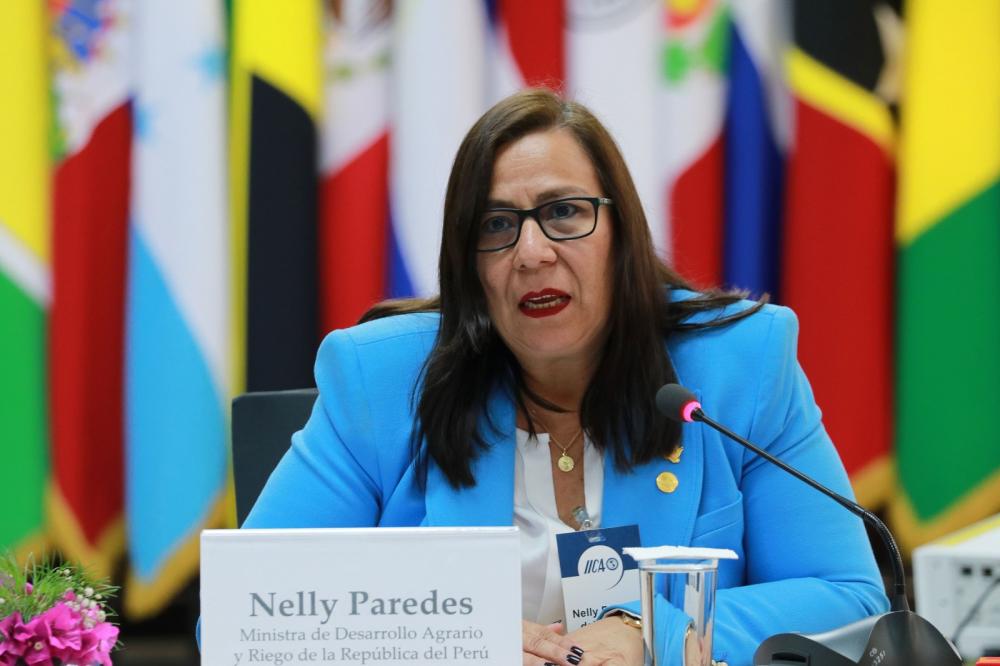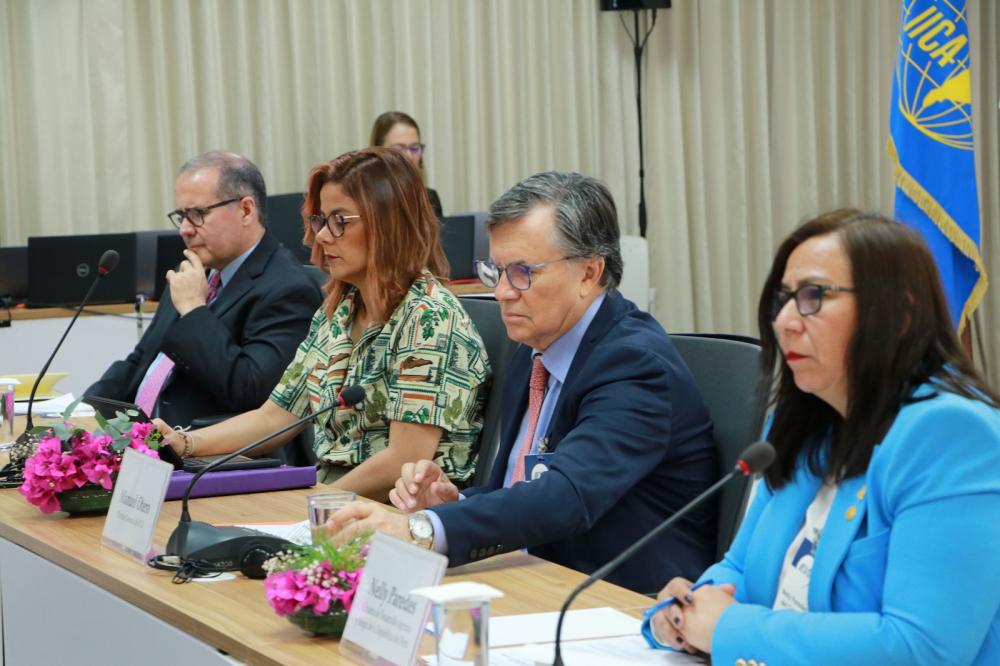At the forum of female ministers of agriculture of the Americas, organized by IICA, minister from Peru says efforts to close gaps and build equity in the care economy are essential for the empowerment of rural women

San José, August 23, 2023 (IICA). During the inaugural session of the IV Forum of Female Ministers, Deputy Ministers and Senior Officials of the Americas, organized by the Inter-American Institute for Cooperation on Agriculture (IICA), Nelly Paredes del Castillo, Peru’s Minister for Agrarian Development and Irrigation, said that while rural women were playing an increasingly bigger role in agriculture in the countries of the Americas, that role was limited by the dominant social, cultural, and technological environment, which adversely affect their empowerment in the rural areas of the hemisphere.
On this occasion, the forum of female ministers of agriculture was held at IICA Headquarters in San José, Costa Rica. Also taking part in the activity were Colombia’s minister of agriculture, Jhenifer Mojica, and Laura Suazo, her counterpart from Honduras; deputy ministers and high-level representatives from Canada, the United States, Brazil and St. Vincent and the Grenadines; and international cooperation and funding agencies.
Other participants included the Secretary General of CARICOM, Carla Barnett, the Director General of IICA, Manuel Otero, and rural leaders from every region of the Americas.
“In Latin America and the Caribbean, rural women do more paid and unpaid in a week than men. According to a time use survey conducted in 2010, rural women in Peru were working 12.5 hours more than men,” Minister Nelly Paredes observed.
“Even more significantly, in my country unpaid activities account for 62% of the work that rural women do, while the figure for men is 31%. The main type of unpaid work involves taking care of other people,” the head of Peru’s Ministry of Agrarian Development and Irrigation (MIDAGRI) added.
Therefore, she said, the challenge as far as greater empowerment of rural women is concerned is to achieve equity in roles and responsibilities. “The excessive burden of domestic duties means that rural women have less time available for other activities, such as education, culture and politics; and it affects their rights, particularly their economic rights,” Paredes added.

According to the Peruvian minister, the COVID-19 pandemic placed the importance of social care squarely in the global spotlight, a development that should prompt the adoption of a raft of regulatory frameworks to underpin the activity.
She suggested that such efforts should take into account the rural and agrarian context in the Americas, the challenge of giving rural women a voice in the formulation of public policies, and the need to develop comprehensive care service policies, assigning value to the knowledge and practices linked to those services.
“In Peru, the agencies working on these issues, in addition to MIDAGRI, are the Ministry for Women and the Ministry of Development and Social Inclusion. So various parts of the State are involved, with rural issues a major focus,” Nelly Paredes explained.
During the forum, Peru’s Minister of Agriculture ¾the third woman to hold the position in her country¾ explained that she had spent the last 30 years promoting the inclusion of rural women, but plenty of work still remained to be done.
“The care economy is a challenge we can’t ignore, we have to find the key so that men share those responsibilities,” she concluded.
More information:
Institutional Communication Division.
comunicacion.institucional@iica.int
According to the Peruvian minister, the COVID-19 pandemic placed the importance of social care squarely in the global spotlight, a development that should prompt the adoption of a raft of regulatory frameworks to underpin the activity.
She suggested that such efforts should take into account the rural and agrarian context in the Americas, the challenge of giving rural women a voice in the formulation of public policies, and the need to develop comprehensive care service policies, assigning value to the knowledge and practices linked to those services.
“In Peru, the agencies working on these issues, in addition to MIDAGRI, are the Ministry for Women and the Ministry of Development and Social Inclusion. So various parts of the State are involved, with rural issues a major focus,” Nelly Paredes explained.
During the forum, Peru’s Minister of Agriculture -the third woman to hold the position in her country- explained that she had spent the last 30 years promoting the inclusion of rural women, but plenty of work still remained to be done.
“The care economy is a challenge we can’t ignore, we have to find the key so that men share those responsibilities,” she concluded.
More information:
Institutional Communication Division.
comunicacion.institucional@iica.int